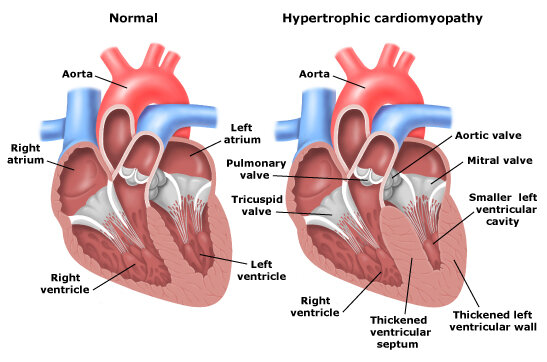must read
Hypertrophic Cardiomyopathy

Hypertrophic cardiomyopathy (HCM) causes the heart’s ventricular walls to thicken (hypertrophy), decreasing the efficiency of heart function and predisposing the patient to congestive heart failure and blood clot formation. Heart scanning by a board Certified Cardiologist is the only way to detect HCM.
Hypertrophic Cardiomyopathy is the most commonly diagnosed cardiac disease in cats. Feline Hypertrophic Cardiomyopathy (HCM) is a condition that causes the muscular walls of a cat’s heart to thicken, decreasing the heart’s efficiency and sometimes creating symptoms in other parts of the body. Although the cause of HCM has not been clearly identified, the fact that the condition is more prevalent in certain breeds (including Maine Coon, Ragdoll, British Shorthair, Sphynx, Chartreux and Persian cats) and that mutations of several cardiac (heart) genes have been identified in some cats with this disease suggests that genetics plays a role.
While the disease’s effects and prognosis (predicted outcome) may vary considerably, proper diagnosis and treatment can decrease the chance that a cat with HCM will experience certain symptoms and can improve his or her quality of life.
In a cat with HCM, the heart’s left ventricle (its primary “pump muscle”) is thickened, leading to a decrease in the volume of the heart chamber and to abnormal relaxation of the heart muscle. These changes can cause the heart to beat rapidly, resulting in increased oxygen usage and possibly to oxygen starvation of the heart muscle. This oxygen starvation may cause heart cells to die off, worsening heart function and leading to the development of arrhythmias (in which the heart beats too rapidly, too slowly, or with an irregular rhythm).
In addition to these difficulties, less efficient blood pumping may also lead to a backup of blood to the other chambers of the heart and to the lungs, which may contribute to the development of congestive heart failure or the formation of blood clots in the heart.
Clinical Signs
Many cats with HCM do not appear to be ill. Others may show signs of congestive heart failure, including labored or rapid breathing, open-mouthed breathing, and lethargy. These symptoms occur when fluid accumulates in or around the lungs.
A serious and potentially life-threatening consequence of HCM is the formation of blood clots in the heart. These clots may travel through the bloodstream to obstruct flow in other parts of the body (thromboembolism). The effect of the clot depends on its location, although in cats with HCM, clots most commonly result in blockage of blood flow to the hind limbs, causing acute hind limb pain or, in extreme cases, hind limb paralysis. Diagnosing HCM and treating the condition properly can help decrease the severity of clinical signs and may decrease the likelihood of thromboembolism.
Although relatively rare, cats with HCM are at risk for sudden death.
Diagnosis
HCM is diagnosed by echocardiography, a technology that uses sound waves to create an image of the heart. In cats with HCM, these images reveal the thickened walls and constricted volume of the left ventricle of the heart. However, similar heart thickening is also caused by other common conditions, including high blood pressure and hyperthyroidism. These diseases must be ruled out prior to diagnosing HCM. Your veterinarian may also recommend other tests, including chest radiographs and electrocardiography, depending on the results of a physical examination and/or echocardiographic findings.
New genetic tests may also help identify whether your cat has an increased risk of HCM, but the results of these screening tests should be interpreted carefully with the guidance of a veterinary professional, since not all cats that have these mutations will develop the condition.
Treatment
Although HCM has no known cure, a specialized care plan can help manage clinical signs of the condition in your cat. Treatment goals include controlling the heart rate, alleviating lung congestion (congestive heart failure), and preventing the formation of blood clots that can lead to thromboembolism.
Medication can help manage HCM, and can be administered orally to stable patients or by injection in more serious situations. Other drugs, such as nitroglycerine, may be applied to the cat’s skin for absorption.
Unfortunately, no therapy has been shown to prevent the progression of HCM when started before clinical signs are observed.
Prognosis
The prognosis (predicted outcome) for cats with HCM is variable. Cats that do not display any clinical signs are often able to survive for years with only mildly compromised heart function.
HCM is most commonly a progressive disease, and findings that suggest a worse prognosis include congestive heart failure, thromboembolism, and hypothermia (low body temperature). However, in many cases, medical therapy can significantly improve your cat’s quality of life.
Talk to your veterinarian today to learn more about your cat’s health and treatment options.